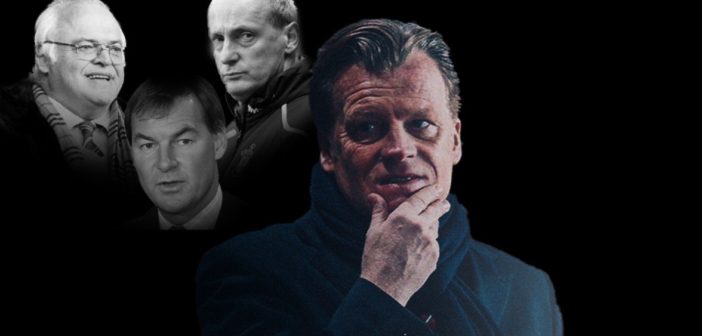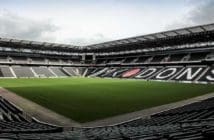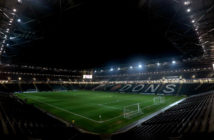Thank you to Adrian Thomas (@adothomas88) and Matt Hemsley (@m_hemsley) who gave the idea for this piece. They both asked for an in-depth look at the Jan Poortvliet/Mark Wotte era.
It was December 2005 and Mark Wotte’s phone had just flashed up with Rupert Lowe’s number.
Lowe, Southampton’s chairman and the rest of his board had just been caught with their pants pulled down and were now being marred by the ultimate humiliation. The resignation of Harry Redknapp, effectively sealing the end to one of the most acrimonious relationships in Southampton’s history, had left the club in a state of flux.
Redknapp, who after overseeing Saints’ first relegation of the Premier League era just months prior, had decided to return to what Lowe described as his ‘spiritual home’ and left almost a year to the day of first arriving. Being caught on the hop was one thing, but being mocked by the club Redknapp would go back to in the same week was a different, more vehement, entity.
On December 7, 2005, Redknapp re-joined Portsmouth. It was a year away and despite Pompey fans previously referring to him as ‘Judas’ and telling him to ‘rot in hell,’ they were now welcoming Redknapp home with open arms. After all, he returned a hero, the chief protagonist in carrying out their fiercest rivals’ execution from the Premier League.
To make matters worse for Lowe, having stuck by his manager in the aftermath of relegation, Redknapp was now deserting in the midst of a Championship season. The Lowe tenure had reached its emphatic nadir and needed quick salvation.
Lowe turned to Mark Wotte, asking the Dutch coach to replace Redknapp. Lowe had become aware of the former Utrecht manager after he’d previously met close friend and performance director Clive Woodward to discuss football management in Holland. Despite Lowe wanting Wotte, a shareholders meeting led the club to appoint George Burley instead.
But the pair would keep in contact and three years later, a similar narrative took hold. This time around, Nigel Pearson was the manager unexpectedly departing.
“I was appointed as Academy Director,” says Wotte, speaking exclusively to Prost International. “Rupert offered me the manager’s job at first (in 2005), but three years later he preferred me in the more long term job of overseeing and upgrading the academy. Rupert asked me to be in charge of the academy but to also manage the reserve team.”
On the pitch, Wotte would be assisted by Scott MacLachlan, a coach that would go on to become the head of international scouting at Fulham and Chelsea. Off the pitch and with an eye on implementing wholesale structural changes, Wotte headed the academy alongside Matt Crocker, Southampton’s current director of football.
“It was a great responsibility and experience too. Matt was a good guy to work with great contacts at the FA. I played all our talented lads from 16-21 years who were not in first team to prepare them for Jan Poortvliet or gave them game-time if they were subs during the weekend.”
Lowe, a man who seems to leave a trail of headlines wherever he stretches his legs (he served as a member of the Brexit party until 2020), brought in Wotte’s compatriot and former Holland international Jan Poortvliet to succeed Pearson. Poortvliet’s appointment as head coach meant Wotte would now become his aide, helping the team when the new boss asked him to.
But not long after, an issue proceeded to come to light. That issue being a rather a large one and proved to foreshadow the all-encompassing chaos Poortvliet and Woote would soon contend with.
Two days after appointing Poortvliet, Lowe realised there was a snag in the deal. Lowe had announced Poortvliet as head coach despite still being under contract at second tier side Dutch side, Helmond Sport. “We are absolutely stunned. There is no way he can have a deal with Southampton,” said Helmond’s managing director Mario Captein, speaking in a strongly worded statement.
“There are no clauses or escape routes in his contract. The last contact we had with him (Poortvliet) was last Thursday. The next morning he was revealed as the new manager of Southampton. Since that day he has never been in touch.”
Captein’s forthright revelation meant Lowe again found his tail between his legs and was forced to pay €75,000 in compensation. Though Helmond’s remuneration’s package wasn’t exactly extortionate, it was money Southampton desperately needed.
“His (Rupert’s) message was clear from day one; ‘there is no budget to improve the squad, the expensive players have to leave and will be replaced by cheaper players and the talented academy players.’ I had met Michael Wilde one time in his estate in the New Forest at the beginning of the season. He was a nice guy but I guess he didn’t wanted to invest anymore to help Rupert.”
Wilde, a 10 percent shareholder in Southampton, was one of the three central figures in the Southampton boardroom. Having brought a stake in the club two years prior, Saints’ demise and boardroom upheaval – Clive Woodward had left a year earlier – meant Wilde was beginning to grow reluctant in handing out more money.
After initially trying to leave the year before, when Saints narrowly escaped relegation to League One under Pearson, Wilde returned and his earlier rival, Rupert Lowe, finally demanded an EGM to remove the third member of the trio, Leon Crouch.
This caused relations between Lowe, Wilde and Crouch to completely disintegrate. “Rupert was the only chairman and his relationship with Michael and Leon was kind of distant in my opinion,” says Wotte.
“They didn’t cooperate very well if I recall. In January we knew the club didn’t even had a small (enough) budget to sign Dexter Blackstock, a player who Jan wanted to bring in.”
Despite starring in the 1978 World Cup, Poortvliet was a relative unknown in the south coast, especially in comparison to Nigel Pearson. The two manager’s characteristics couldn’t have been more different, with Pearson’s no-nonsense demeanour being traded for Poortvliet’s more cerebral approach. Lowe had sought the Dutchman after recognising the work he had done with low-budget clubs in Holland.
While Poortvliet was employed to as some sort of troubleshooter and Wotte given the thankless task of attempting to fast-track some players from the academy to replace star departures, Wilde’s initial statement would mask over the underlying issues within the club.
In a public pronouncement on Southampton’s website, Wilde claimed in a club statement that Poortvliet was brought in to apply a “European style coaching system,” and ultimately lead to a more attractive brand of football. “The board believe this will create opportunities for our younger players, which might not occur within the traditional English management structure,” the Southampton chairman remarked.
“Jan preferred the 4-3-3 system with the passing game,” Wotte points out when asked what the differences were between himself and Poortvliet. “I was also an advocate of this Dutch system for all academy teams but used later also the 4-4-2 with a diamond midfield successfully with the first team. It suited the players better with Jason Euell and David McGoldrick upfront and Lallana on the 10 position behind the two.”
But rather than getting the aesthetically-pleasing transformation the board had been looking for, Southampton’s fortunes nosedived further. Seven months after joining and second to bottom in the league, Poortvliet resigned in January.
The Monday after, Wilde called a press conference to explain Wotte would be appointed head coach until the end of the season.
“Jan resigned because of a sequence of bad results at home,” says Wotte. “He got frustrated with the lack of support to sign some quality players in the January window. He didn’t had any problem for me and Dean Gorré (and Michael Svensson) to take the job, it was him who took the decision to quit and suggested to us to take the helm.”
Wotte admits despite the players doing all they could to turn the tide, the ever-growing instability off the pitch meant they could not halt the club from tailspinning. “In my time the players that stood out in the dressing room, were of course the likes of Paul Wotton, Kelvin Davis, Chris Perry, Jason Euell, Lee Holmes but also Keith Granger and Michael Svensson kept the dressing room going and the youngsters focused. They were a big help for me.
“On top of that, after we made a good run in February or March with three wins in a row, the poor financial situation started to become known in the dressing room and that was confirmed when Rupert Lowe had to step down as chairman and the club went in administration.
“It was not an easy task to survive for all of us, especially when on the 1st of March and April the salaries were not paid just before some three decisive games in 10 days.”
Three years on from Redknapp’s exit, bitter rivals Portsmouth were still feeling a sense of schadenfreude every time they looked at what was happening along the coast. In spite of Wotte’s progressive efforts to revitalise the club, external factors essentially rendered it impossible.
Southampton finished 23rd and were relegated to League One. They had just won 10 games all season. “The basic problem in hindsight? The poor financial situation is obvious,” Wotte states, rather matter of factly.
“The young players in the squad were just one year too young to really ensure to help Southampton stay in the Championship. (Adam) Lallana, (Morgan) Schneiderlin, (Bradley) Wright- Phillips, (Andrew) Surman, (David) McGoldrick, (Joseph) Mills, (Simon) Gillett, (Lloyd) James, (Olly) Lancashire and (Ben) Reeves.
“All fantastic lads and full of great potential but they were still in their first 10 to 30 professional games and step-by-step developing at the same time. They were also playing in a very physically demanding and strong league. So I could not blame anyone of them.”
Though the initial plans were for Wotte to return to his previous role within the academy once the season was over, the departure of Lowe as Southampton looked to be heading into the abyss meant all prelaid plans were cast aside.
“After the season finished I signed an extension for the new season to get back to the Championship as soon as possible. I remember well in that summer we had several consortiums trying to buy the club.”
One of those consortiums Wotte would become aware of were two gentleman, both holding firm interest in buying the club outright. “One day I was asked to come up to the boardroom for a meeting with a contender named Markus Liebherr.
“I tried my best to persuade in this personal conversation with Mr Liebherr and (his partner) Nicola Cortese for him to buy the club. I told them I saw a great opportunity for a new owner.”
Wotte spoke to the pair about prospective plans to utilise St Mary’s, a relatively new stadium at the time, and waxed lyrical about the esteemed history of what Wotte calls the ‘renowned Southampton academy’. The Saints interim boss also told Cortese and Liebherr that the club would soon have a crop of young, talented players, all about to emerge into the first team.
And as we know by now, what Wotte said to Liebherr and Cortese that day would prove prophetic. “I was very happy that he (Liebherr) bought Southampton, but I was then told soon after that he wanted to make a clean slate and was relieved of my duties although we were four weeks into pre-season.
“I was obvious disappointed to be replaced by Alan Pardew, but Mr Liebherr explained it well and fulfilled all his obligations to me correctly and that was it. No hard feelings.”
Wotte arrived with Poortvliet in a time that was fraught with controversy at Southampton. Despite the Dutch duo’s best intentions, they couldn’t shake the general malaise the club had long been entrenched in. While it would be easy to attribute blame to others, most notably Rupert Lowe, Wotte wants to make clear his relationship with the former board member isn’t what you might expect.
“I truly appreciated Rupert as a chairman as well as a person. I am convinced he had the best intentions with Saints. He was responsible for the only big recruitment in the summer of 2008, the talented Morgan Schneiderlin, who was not only a fantastic young French youth international but turned out to be a substantial return on the investment a couple of years later.
“(It was) too bad he wasn’t able to find a couple of sponsors or people that were prepared to invest with him in the club.”
Throughout this writer’s two hour discussion with Wotte, the former Saints boss appeared rather philosophical about his time spent on the south coast. Wotte, who would later become Scotland’s performance director, insists he reflects on that period with much fondness and takes delight in seeing the club back in the Premier League.
“I always loved my time at Saints, at St Mary’s, within the history (of the city) and being involved in the academy at the training ground. I lived in a small apartment in Ocean Village and spent everyday at Staplewood.
“The story of Southampton changed drastically soon after with the investments and I could not be more pleased for the people at the club and of course the loyal fans, to witness them going upwards and onwards to the respectable Premier League Club they are today.”
A man with a penchant for making prophetic statements, Wotte knew all hope was not lost at Southampton football club, in defiance of the disarray he encountered. He sensed the potential for development, even if he wasn’t the one to provide the scope for change.
Irrespective of managing a club on the brink of liquidation and facing relegation, Wotte maintains he had reason for optimism throughout.
This writer asks how come.
“Despite the financial crisis, I got my pleasure in getting to one of the training pitches with the lads, or watching the under-13’s play every opponent off the park. They had James Ward-Prowse, Calum Chambers, Harrison Reed and Luke Shaw in the team.”
As it turns out, Mark Wotte knew Southampton would be alright.
Follow us on Twitter @ProstInt
![Prost International [PINT]](https://prostinternational.com/wp-content/uploads/2021/08/PINTtFontLogoRoboto1536x78.jpg)



